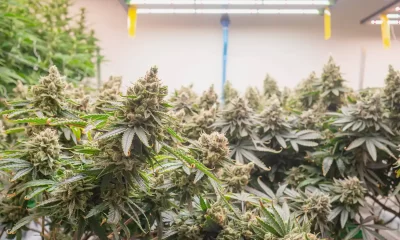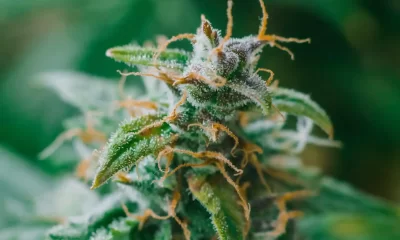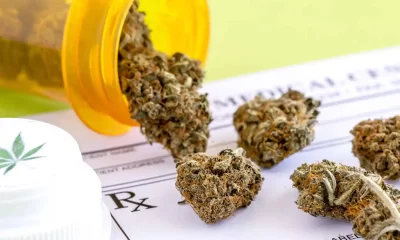Business
Thailand Cannabis Advocates Rally After Lawsuit Challenges Decriminalization

The Central Administrative Court in Thailand accepted a lawsuit challenging the country’s decriminalization order.
The future of Thailand’s cannabis industry is up in the air after a new legal challenge could bring everything to a screeching halt. In response, advocates in the country are mobilizing today in Bangkok to fight back.
An order, issued by Thailand’s Public Health Ministry, effectively removed cannabis from the country’s Category 5 narcotics list on June 9. Under those regulations, marijuana and hemp cultivation and commerce were legalized. Restaurants and cafes are permitted to sell foods and beverages infused with cannabis, but only if they contain no more than 0.2% THC. Products with higher concentrations of THC are permitted, but only for medicinal purposes.
Things didn’t go over well with the opposition, however, and Thailand’s cannabis industry was slammed for its lack of basic controls. The opposition argues that Health Minister Anutin Charnvirakul caused social problems for the country and violated local and international laws by issuing the decriminalization order. In response to the growing criticism, the Public Health Ministry announced a new ministerial rule to better control the promotion and sale of cannabis flower, but the law has not yet taken effect.
The Central Administrative Court on Monday accepted a lawsuit spearheaded by Smith Srisont of Thailand’s Medical Council and MPs from opposition political parties who seek to revoke the decriminalization order. Srisont is a member of the Medical Council and president of the Forensic Physician Association of Thailand. His lawsuit names Charnvirakul and the Narcotics Control Board (NCB) as co-defendants.
The political parties opposed to cannabis include Move Forward, Pheu Thai, Thai Liberal, Thai People Power, and Prachachat parties.
Cannabis advocates in the area, however, aren’t going to accept the current legal challenge and are making efforts to have their voices heard.
Cannabis Advocates Fight Back
One of Thailand’s top cannabis advocates Chokwan “Kitty” Chopaka announced on Facebook that she and other dispensary owners would rally together at noon on November 22 at the Government House in Bangkok to protest against the lawsuit that could end everything.
“Dropping by different dispensaries around Sukhumvit to invite them to attend the protest tomorrow which went better than what I thought, I guess having your business threaten can make people quite active,” Chopaka posted on Facebook, translated from Thai.
“I apologize if I could not personally invite every dispensary, and I would like to take this time to invite all dispensaries to come out and protest against the Narcotics Control Board re-criminalizing cannabis again. Which means that all dispensaries may get shut down.”
“Those that do not want their businesses shut down. Those that do not want their investment disappeared. Those that do not want to hide their grow again. Those that want to sell cannabis legally. Those that do not want to go back to getting piss tested. Those that want to see cannabis stay legal, come and join us.”
ABC News reports that about 200 people showed up to the rally at the Government House in Bangkok. “We want to ensure that these politicians are not trying to put cannabis on the narcotics list again. If that happens, our fight for years will mean nothing,” Akradej Chakjinda, a coordinator of Cannakin, a network of cannabis decriminalization supporters, told The Associated Press.
A proposed bill, the Cannabis Act, would implement Anutin’s decriminalization policy, and will be introduced in Parliament on November 23.
Another advocate, Soranut “Beer” Masayavanich, owner of Sukhumweed dispensary, announced that another group will gather at the Ministry of Public Health to discuss the upcoming Cannabis Act with Charnvirakul.
“We aim to create mutual understanding on benefits that cannabis will bring,” Beer stated. “We insist that decriminalizing cannabis brings benefits to several sectors from tourism and economy to agriculture.”
Opposition leaders say that it is better to put cannabis back on the country’s banned narcotics list until the proper legislation is put into place.
Business
New Mexico cannabis operator fined, loses license for alleged BioTrack fraud

New Mexico regulators fined a cannabis operator nearly $300,000 and revoked its license after the company allegedly created fake reports in the state’s traceability software.
The New Mexico Cannabis Control Division (CCD) accused marijuana manufacturer and retailer Golden Roots of 11 violations, according to Albuquerque Business First.
Golden Roots operates the The Cannabis Revolution Dispensary.
The majority of the violations are related to the Albuquerque company’s improper use of BioTrack, which has been New Mexico’s track-and-trace vendor since 2015.
The CCD alleges Golden Roots reported marijuana production only two months after it had received its vertically integrated license, according to Albuquerque Business First.
Because cannabis takes longer than two months to be cultivated, the CCD was suspicious of the report.
After inspecting the company’s premises, the CCD alleged Golden Roots reported cultivation, transportation and sales in BioTrack but wasn’t able to provide officers who inspected the site evidence that the operator was cultivating cannabis.
In April, the CCD revoked Golden Roots’ license and issued a $10,000 fine, according to the news outlet.
The company requested a hearing, which the regulator scheduled for Sept. 1.
At the hearing, the CCD testified that the company’s dried-cannabis weights in BioTrack were suspicious because they didn’t seem to accurately reflect how much weight marijuana loses as it dries.
Company employees also poorly accounted for why they were making adjustments in the system of up to 24 pounds of cannabis, making comments such as “bad” or “mistake” in the software, Albuquerque Business First reported.
Golden Roots was fined $298,972.05 – the amount regulators allege the company made selling products that weren’t properly accounted for in BioTrack.
The CCD has been cracking down on cannabis operators accused of selling products procured from out-of-state or not grown legally:
- Regulators alleged in August that Albuquerque dispensary Sawmill Sweet Leaf sold out-of-state products and didn’t have a license for extraction.
- Paradise Exotics Distro lost its license in July after regulators alleged the company sold products made in California.
Golden Roots was the first alleged rulebreaker in New Mexico to be asked to pay a large fine.
Source: https://mjbizdaily.com/new-mexico-cannabis-operator-fined-loses-license-for-alleged-biotrack-fraud/
Business
Marijuana companies suing US attorney general in federal prohibition challenge

Four marijuana companies, including a multistate operator, have filed a lawsuit against U.S. Attorney General Merrick Garland in which they allege the federal MJ prohibition under the Controlled Substances Act is no longer constitutional.
According to the complaint, filed Thursday in U.S. District Court in Massachusetts, retailer Canna Provisions, Treevit delivery service CEO Gyasi Sellers, cultivator Wiseacre Farm and MSO Verano Holdings Corp. are all harmed by “the federal government’s unconstitutional ban on cultivating, manufacturing, distributing, or possessing intrastate marijuana.”
Verano is headquartered in Chicago but has operations in Massachusetts; the other three operators are based in Massachusetts.
The lawsuit seeks a ruling that the “Controlled Substances Act is unconstitutional as applied to the intrastate cultivation, manufacture, possession, and distribution of marijuana pursuant to state law.”
The companies want the case to go before the U.S. Supreme Court.
They hired prominent law firm Boies Schiller Flexner to represent them.
The New York-based firm’s principal is David Boies, whose former clients include Microsoft, former presidential candidate Al Gore and Elizabeth Holmes’ disgraced startup Theranos.
Similar challenges to the federal Controlled Substances Act (CSA) have failed.
One such challenge led to a landmark Supreme Court decision in 2005.
In Gonzalez vs. Raich, the highest court in the United States ruled in a 6-3 decision that the commerce clause of the U.S. Constitution gave Congress the power to outlaw marijuana federally, even though state laws allow the cultivation and sale of cannabis.
In the 18 years since that ruling, 23 states and the District of Columbia have legalized adult-use marijuana and the federal government has allowed a multibillion-dollar cannabis industry to thrive.
Since both Congress and the U.S. Department of Justice, currently headed by Garland, have declined to intervene in state-licensed marijuana markets, the key facts that led to the Supreme Court’s 2005 ruling “no longer apply,” Boies said in a statement Thursday.
“The Supreme Court has since made clear that the federal government lacks the authority to regulate purely intrastate commerce,” Boies said.
“Moreover, the facts on which those precedents are based are no longer true.”
Verano President Darren Weiss said in a statement the company is “prepared to bring this case all the way to the Supreme Court in order to align federal law with how Congress has acted for years.”
While the Biden administration’s push to reschedule marijuana would help solve marijuana operators’ federal tax woes, neither rescheduling nor modest Congressional reforms such as the SAFER Banking Act “solve the fundamental issue,” Weiss added.
“The application of the CSA to lawful state-run cannabis business is an unconstitutional overreach on state sovereignty that has led to decades of harm, failed businesses, lost jobs, and unsafe working conditions.”
Business
Alabama to make another attempt Dec. 1 to award medical cannabis licenses

Alabama regulators are targeting Dec. 1 to award the first batch of medical cannabis business licenses after the agency’s first two attempts were scrapped because of scoring errors and litigation.
The first licenses will be awarded to individual cultivators, delivery providers, processors, dispensaries and state testing labs, according to the Alabama Medical Cannabis Commission (AMCC).
Then, on Dec. 12, the AMCC will award licenses for vertically integrated operations, a designation set primarily for multistate operators.
Licenses are expected to be handed out 28 days after they have been awarded, so MMJ production could begin in early January, according to the Alabama Daily News.
That means MMJ products could be available for patients around early March, an AMCC spokesperson told the media outlet.
Regulators initially awarded 21 business licenses in June, only to void them after applicants alleged inconsistencies with how the applications were scored.
Then, in August, the state awarded 24 different licenses – 19 went to June recipients – only to reverse themselves again and scratch those licenses after spurned applicants filed lawsuits.
A state judge dismissed a lawsuit filed by Chicago-based MSO Verano Holdings Corp., but another lawsuit is pending.
Source: https://mjbizdaily.com/alabama-plans-to-award-medical-cannabis-licenses-dec-1/
-

 Business2 years ago
Business2 years agoPot Odor Does Not Justify Probable Cause for Vehicle Searches, Minnesota Court Affirms
-

 Business2 years ago
Business2 years agoNew Mexico cannabis operator fined, loses license for alleged BioTrack fraud
-

 Business2 years ago
Business2 years agoAlabama to make another attempt Dec. 1 to award medical cannabis licenses
-

 Business2 years ago
Business2 years agoWashington State Pays Out $9.4 Million in Refunds Relating to Drug Convictions
-

 Business2 years ago
Business2 years agoMarijuana companies suing US attorney general in federal prohibition challenge
-

 Business2 years ago
Business2 years agoLegal Marijuana Handed A Nothing Burger From NY State
-

 Business2 years ago
Business2 years agoCan Cannabis Help Seasonal Depression
-

 Blogs2 years ago
Blogs2 years agoCannabis Art Is Flourishing On Etsy













